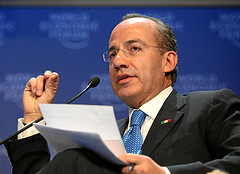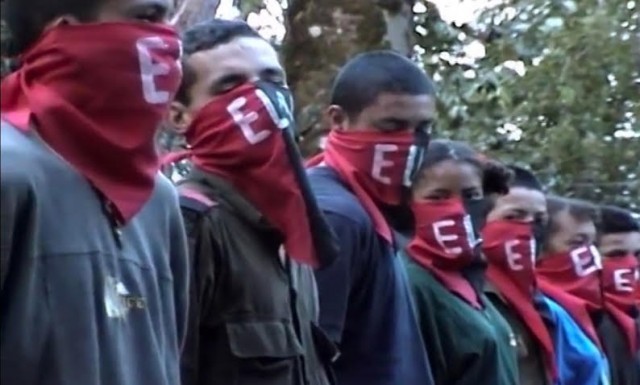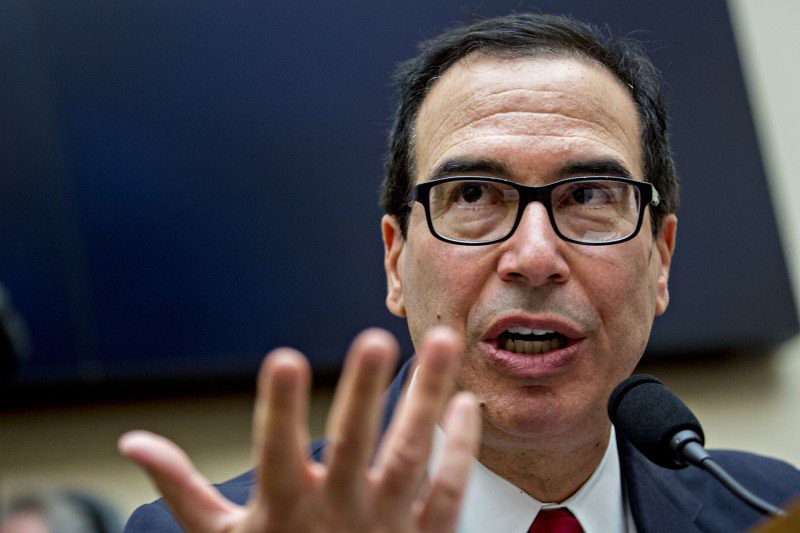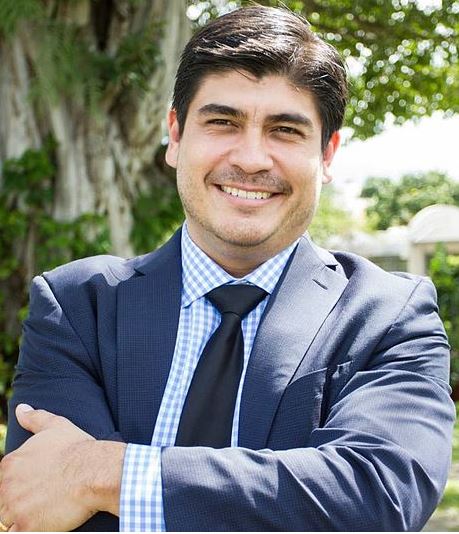
Latin America: Week in Review, Mexico
Mexican Drug War Violence Continues With 5 Massacres, Leaving More Than 50 Dead
October 29, 2010 By Staff

Mexican President Felipe Calderón.
Today in Latin America
Top Story — Violence has continued to torment Mexico this week, with five massacres leaving more than 50 people dead.
On Thursday, armed men shot down six men at a convenience store, The Associated Press reported. The shootings in Mexico City, far from the northern states where drug war violence has been concentrated, has prompted new concerns that cartel violence may be spreading.
An episode of violence also occurred on Thursday in the border city of Ciudad Juárez, where four people were killed.
Gunmen also shot down 15 people at a carwash in the Pacific state of Nayarit on Wednesday, according to The Dallas Morning News.
The news of a spike in violence in Mexico comes just as California debates decriminalizing marijuana. While some argue that decriminalizing the popular drug would lead to a reduction in incarceration rates in the United States, Mexican President Felipe Calderón and other Latin American leaders have said that decriminalizing marijuana sends a contradictory message to countries that are battling drug cartels.
Just Published at the Latin America News Dispatch
- Peruvian presidential candidate Ollanta Humala outlined his nationalist program on Thursday in New York, saying it would transform Peru from a mineral exporting country to an industrialized country that privileges the internal market.
- With it the nation’s toughest state immigration law, Arizona has taken center stage in the national debate about immigration as the midterm elections approach. Molly O’Toole reports from Arizona in a three-part series.
- The threat to freedom of the press posed by Mexico’s drug cartels begs a bilateral response, a panel of journalists and press freedom groups said in New York Tuesday. Andrew O’Reilly has more.
Headlines from the Western Hemisphere
North America
- Nearly two-thirds of Latinos in the United States think they are being discriminated against, according to a poll by the Pew Hispanic Center.
- Mexican police rescued at least 23 Honduran undocumented migrants, including six children, who were kidnapped for ransom, the Tabasco state prosecutor’s office said.
Caribbean
- The cholera outbreak in Haiti is worrying tourism officials in the neighboring Dominican Republic and prompting seaside resorts to beef up sanitation measures, officials said Thursday.
- The New York Philharmonic has renewed efforts to obtain approved travel to Cuba.
Central America
- Costa Rican President Laura Chinchilla sent her condolences to Argentine President Cristina Fernández de Kirchner, whose husband died of a heart attack Wednesday.
- Panama suspended free trade talks with Colombia due to an impasse over agricultural issues, market access and customs cooperation, said Francisco Alvarez, Pamana’s deputy trade minister.
- Nicaraguan baseball player Huembes Gustavo López, 28, was taken into custody for allegedly sexually assaulting a woman.
Andes
- Ecuador’s judicial authorities disbarred a judge who had been accused of misconduct and involvement in a bribery scheme in a high profile oil pollution lawsuit against Chevron Corp.
- Iranian President Mahmoud Ahmadinejad and his visiting Bolivian counterpart Evo Morales took part in soccer game in Tehran on Wednesday.
Southern Cone
- Argentine bonds posted huge gains and stocks hit a record high Thursday, after the death of former President Nestor Kirchner.
- Chile’s LAN airlines agreed to pay $32.5 million to acquire the Colombian airline Aires and expects the deal to close in 30 to 60 days.
- Brazilian ruling party candidate Dilma Rousseff maintained her lead over opposition challenger Jose Serra in the lead-up to Sunday’s presidential runoff.
- Former Paraguayan international goalkeeper Jose Luis Chilavert is accused of hitting an agent after a dispute over money.
Image: World Economic Forum @ Flickr.
Subscribe to Today in Latin America by Email






1 Comment
When marijuana is decriminalized in California, Latin American governments will have no choice other than do the same.
Too bad, no more drug payoffs to corrupt government officials.
This could be the turning point in turning for Latin America towards a new era of prosperity.
Comments are closed.